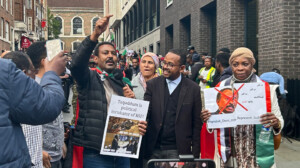Sudanese rebel leader refuses to ‘sit down with regime’
Jibril Ibrahim, head of the Justice and Equality Movement (JEM), has rejected the resumption of negotiations with the government, due to be held in Doha in January, to protest the killing and detention of peaceful demonstrators in Sudan over the past three weeks.
 Minni Minawi (left) and Jibril Ibrahim (right) at a press conference (file photo)
Minni Minawi (left) and Jibril Ibrahim (right) at a press conference (file photo)
Jibril Ibrahim, head of the Justice and Equality Movement (JEM), has rejected the resumption of negotiations with the government, due to be held in Doha in January, to protest the killing and detention of peaceful demonstrators in Sudan over the past three weeks.
During an annual ceremony held in Paris to commemorate the movement's victims, Ibrahim said: "We have refused to sit down with the regime in Doha,” acting in solidarity with nationwide protests calling for president Al Bashir to step down from power which have just entered their fourth week.
He said, "They asked us to go to negotiate but we refused, saying we cannot betray the Sudanese revolution at this critical moment". Ibrahim also pointed out that “we fear the regime will exploit the negotiations in its propaganda, in order to quell the revolution.”
The JEM and Sudan Liberation Movement (SLM-MM) of Minni Minawi leadership were due to discuss the resumption of negotiations with the Sudanese government in Doha this month. This was going to be the next step after all parties signed a pre-negotiation agreement on December 6, 2018.
The pre-negotiation agreement
At the time, Ibrahim said that the pre-negotiation agreement with the Sudanese government would pave the way for the resumption of peace talks.
The first step of the talks in January would be to establish a suitable mechanism to implement outcome of the negotiations between the two movements and the government of Sudan.
The second step would be to resume negotiations, provided that the Doha Agreement for Darfur Peace in Darfur is the basis for this and that all issues which the two movements believe are needed to achieve a comprehensive and sustainable peace in Darfur are included. These involve issues related to the causes of war and the treatment of its consequences. An important focus for the two signatories is displaced persons and refugees and concerns about their return, compensation, and land rights.
Doha Document for Peace
The holdout groups including the JEM and SLM-MM refused to sign the DDPD in July 2011 and called to open the framework agreement for talks.
Two SLM splinter factions, led by Nourelding Zorgi and Salih Ishag, signed an agreement with the Sudanese government in February 2015 and became part of the Doha Document for Peace in Darfur. The agreement was initially signed on 11 July 2011 between the Sudanese government and the Liberation and Justice Movement (LJM) of Tijani El Sese. The faction of the Justice and Equality Movement (JEM) led by Dabajo broke away from the mainstream JEM in 2012, and signed the DDPD in April 2013.
Historically, movements in Darfur have been hesitant to sign the agreement, claiming that it does not tackle the lack of prosectution of war crimes, crimes against humanity and genocide, and also that there are no clear provisions for displaced persons to reclaim their land.











 and then
and then